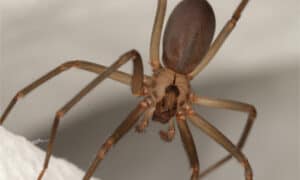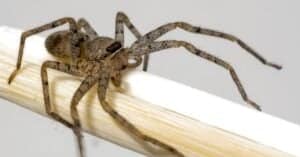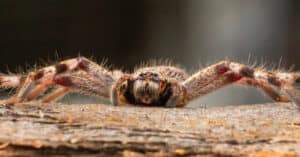Many people both respect and fear the spider. This creature hails from the class Arachnida, comes in countless different forms, and is seen the world over. In many instances, spiders strike spine-tingling fright in those encountering them. Unfortunately, however, certain types prove far more dangerous. Spider bites are capable of causing pain and, in some cases, serious illness. Learn 19 pet-safe spider-repelling methods.
Vinegar Solution

Vinegar’s acidic quality disrupts a spider’s senses.
©Joseph Creamer/Shutterstock.com
One who has smelled or tasted vinegar knows just how powerful it is to those senses. Vinegar’s particular aroma and strong acidic content also disrupt a spider’s sense of smell and make it far more difficult for them to hunt for insects.
Moreover, vinegar is readily affordable and usually found at every local supermarket. Additionally, creating a simple solution mixed with water and applied using a spray bottle often proves effective in combating spiders.
Essential Oils

Essential oils produce powerful scents spiders hate.
©botamochi/iStock via Getty Images
Oils are created from natural products such as citrus fruits like oranges and lemons, in addition to plant products like lavender, eucalyptus, rosemary, and frankincense. These products produce unique aromas capable of irritating a spider’s senses. Furthermore, they are available in liquid formulas or created using devices like diffusers.
Diatomaceous Earth
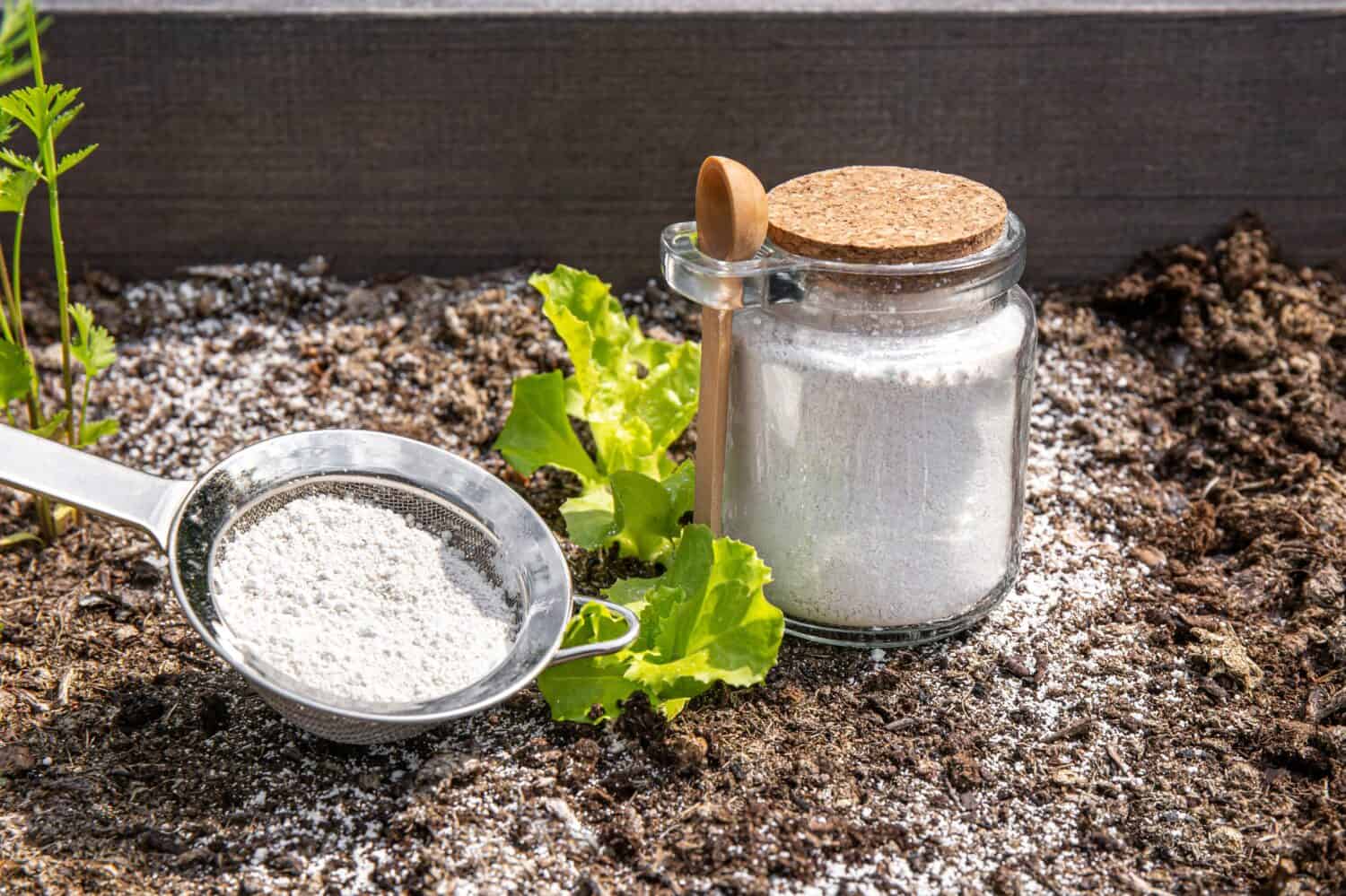
Diatomaceous earth causes physical injury to spiders.
©FotoHelin/Shutterstock.com
Though it has a fancy name, diatomaceous earth is merely rock dissolved into powder. That said, the material contains particles sharp enough to injure a spider’s skeleton and outer body. Pest control professionals recommend placing the product in gardens and under a home or office building’s doors and windows.
Cedar
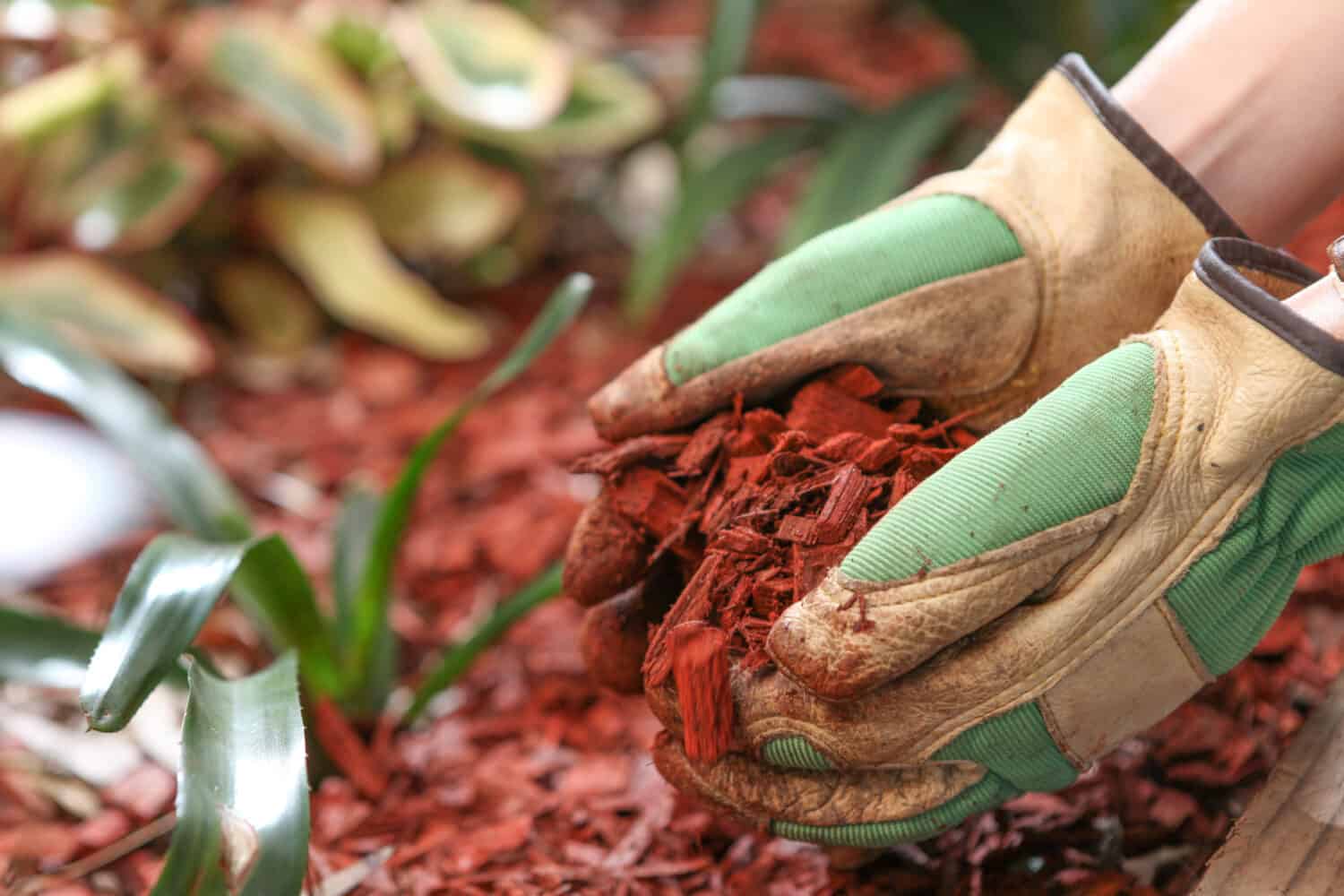
Chips made of cedar wood make it difficult for spiders to walk and hunt.
©OzCameraman/Shutterstock.com
When chopped into chips and blocks, cedar wood disrupts a spider’s ability to walk properly. Over time, they lose their capacity to hunt and gather insects. Home and business owners are encouraged to place this material in gardens and spaces commonly visited by spiders such as basements, attics, and crawl spaces.
Cinnamon
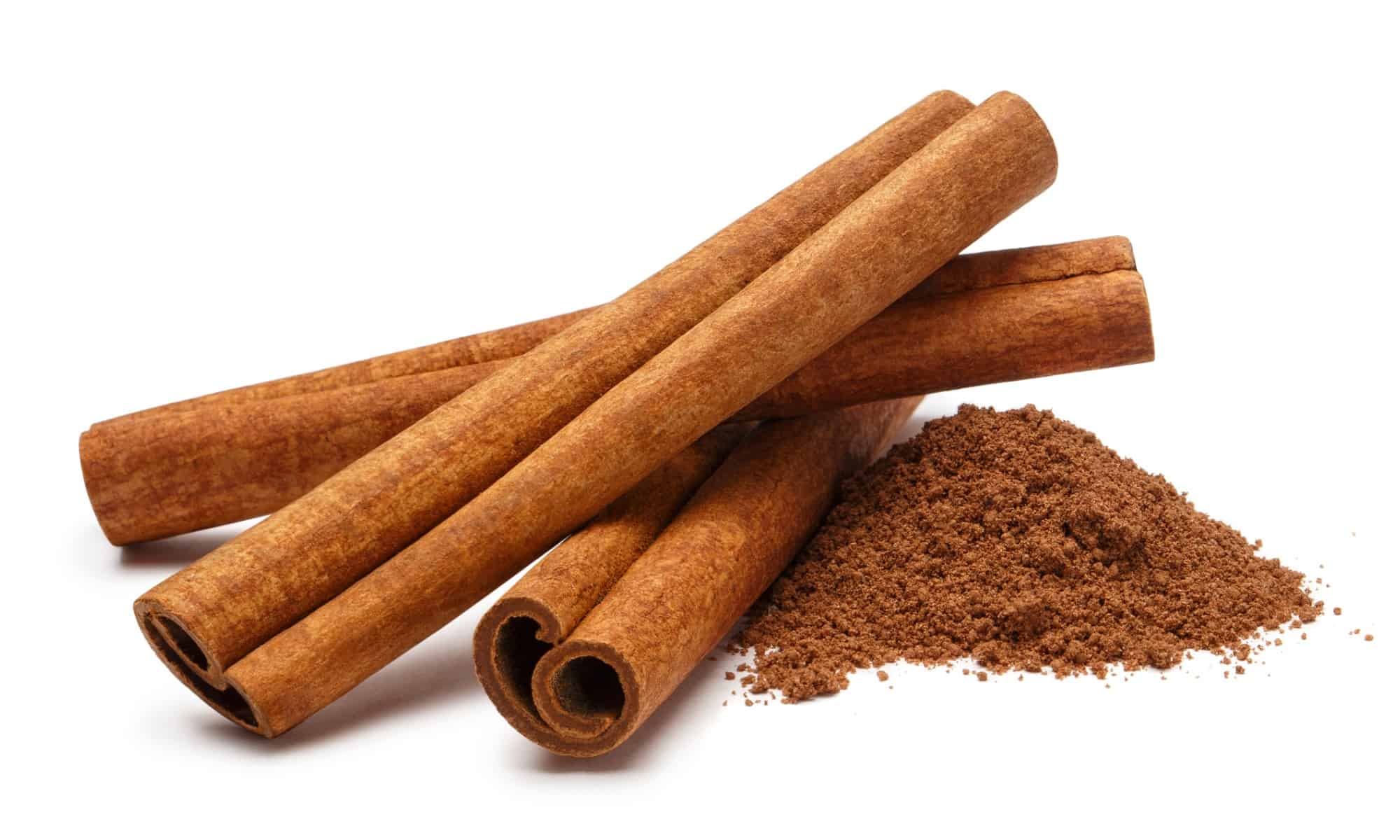
The aroma of cinnamon proves toxic to spiders.
©iStock.com/Marat Musabirov
Cinnamon gives off a unique but powerful aroma. To spiders, the odor often proves toxic. The common cooking spice comes in several spider-eliminating forms such as powder, sticks, scented candles, and oils.
Darkness

Limiting light cuts down on attracting other insects.
©User9637786_380/ via Getty Images
By itself, limiting the amount of light entering a home or business does nothing to discourage spiders from visiting. However, other insects are often drawn to light like ants and gnats. Spiders prey on these critters. Therefore, property owners stand a better chance of getting rid of spiders if they create an uncomfortable environment for the insects they feed on. Two effective light-reducing efforts include the installation of window shades or blinds and turning lights off when not absolutely necessary.
Discarding Old Produce Products

Old or rotting produce attracts insects that spiders feed on.
©Alexandra Lande/Shutterstock.com
Though healthy and filled with nutrients, produce products like fruits and vegetables hold a notorious reputation for aging and going bad fast. Rotting produce attracts pests like fruit flies. Aside from being annoying, these tiny winged insects provide a significant food source for many spiders. Therefore, old or rotten produce should be discarded as soon as possible.
Keeping Pet Food Covered at All Times

Spider prey like ants and flies are drawn to open pet food containers.
©alex_ugalek/iStock via Getty Images
Pet food attracts insects. Spiders feed on these life forms. Ergo, dog, cat, or any other pet food must stay covered at all times. Pet owners storing food in plastic containers need to ensure the tightness of lids or covers. Pet food bags must be secured using twist ties, zippers, or other strong fastening devices.
Addressing Unwanted Open Spaces

Exterior and interior open spaces like cracks and crevices require immediate repair.
©Harvey Harrison / CC BY-SA 3.0 - License
Unwanted open spaces inside or outside a home or office need fixing fast. Cracks or holes appearing on external structures like a roof or foundation or internal features such as walls, ceilings, or floors offer spiders and other insects an open invitation to come in and make themselves comfortable.
Caulking and other sealing materials commonly found in home improvement retail chains often fix minor openings. However, widespread or large cracks may require a professional construction contractor’s services.
Removing Trash Frequently

Old, rotting, or smelly trash provides a breeding ground for insects.
©vchal/Shutterstock.com
A home’s residents or a business’s staffers must throw out trash often. Garbage sitting around for any length of time will likely draw bugs like flies, ants, and even cockroaches. Where these critters go, prey like spiders surely follow.
Trash should be taken out at least twice daily in the morning and again during the evening. In addition, position garbage receptacles as far away from a residence or business as humanly possible. Furthermore, a home’s residents or a business’s employees should consider bringing garbage to a dump site if professional trash haulers do not collect refuse at least twice per week.
Removing Recyclable Products Often

Though sometimes overlooked, recyclable materials often attract as many insects as garbage does.
©Kelly vanDellen/Shutterstock.com
Recyclable materials hold the ability to attract spiders and their insect food sources. For example, collections of papers often draw termites. Cans and bottles once housing soda or beer attract flies. Therefore, such products must be recycled frequently. If they need to be stored for any length of time, these products must be kept in tightly secured containers instead of open trash bags.
Practicing Good Property Maintenance

Well-maintained properties limit places spiders have to hide out.
©Simone Hogan/Shutterstock.com
Property owners must trim shrubs, rake leaves, keep lawns short, remove weeds, and cut down aging or ailing trees. Failure to do so gives spiders places to hide out and nest. Moreover, shrubs should be planted as far away from the home or office as possible.
Keeping the Indoors Neat and Tidy

Clean dwellings are less likely to attract insects.
©Stanislav Sorokin/iStock via Getty Images
Tossing garbage is not enough to prevent spider prey from accumulating. Property owners must perform other cleanliness-promoting actions such as dusting, washing dishes and eating utensils soon after using them, as well as washing and drying clothes after one or two fittings. Anything dirty or unkempt stands at greater risk of producing foul odors capable of drawing attention from insects.
Avoiding Dampness and Humidity

Excess water and humid conditions carry the potential to attract spiders directly and indirectly.
©Alexwilko/Shutterstock.com
Property managers and homeowners must keep their dwellings as dry as possible. Standing water or leaks from damaged roofs or aging pipes, in addition to excessively humid conditions, often cause extensive damage and weaken structures enabling spiders and other bugs an entry point.
Therefore, a home’s residents and businesspeople should be on the lookout for signs of water damage such as stains on walls and ceilings, buckling paint and wallpaper, and wind drafts coming from unidentifiable locations. Additionally, air conditioning should be run during the summer months to avoid humidity buildup.
Limiting Clutter

Open space is good when it comes to organization and decreases a home or business’s risk of attracting spiders.
©Kristen Prahl/Shutterstock.com
A residence or office must be free of clutter. Environments filled with boxes, papers, clothing, and other items give spiders and their insect brethren a suitable place to hide out and provide a haven for insect-attracting pitfalls like dirt and dust to thrive. Suggested decluttering methods include throwing away all items one no longer needs and placing belongings in large, tightly sealed plastic containers.
Using Dish Soap

Common cleansing items like soap often prove effective in eradicating spiders.
©studio kacha/Shutterstock.com
Sometimes, simple concoctions made out of water and common household cleansing items like dish or bath soap produce favorable outcomes. Many soaps contain citrusy or flowery fragrances spiders do not like. Home and business owners might reduce the appearance of spiders by placing soap and water concoctions into spray bottles and applying the mixture in areas the creepy crawlers often frequent.
Playing Music

The vibrations music produces interfere with a spider’s movement rhythms.
©Brian Goodman/Shutterstock.com
Spiders typically hunt in conjunction with specific movement patterns. Loud music disrupts these patterns and confuses the critters. Over time, these disruptions make hunting difficult and inspire spiders to search for food elsewhere.
Adopting a Cat

Cats are natural predators of spiders.
©Georges Hanna/Shutterstock.com
Homeowners dealing with spiders who do not own a cat should strongly consider adopting a furry feline friend. Cats are one of a spider’s natural predators. Therefore, a residence or business is often well-served by letting a cat roam and allowing nature to take its course.
Introducing Frogs Into a Garden
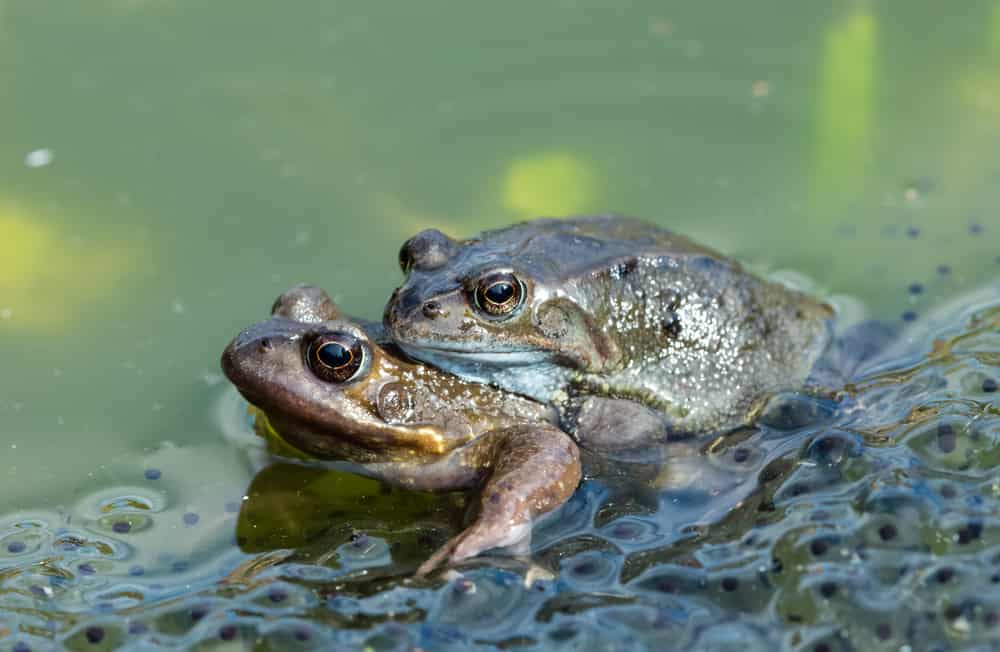
Like cats, frogs naturally prey on spiders.
©Anne Coatesy/Shutterstock.com
One might prevent spiders from entering their home or business by introducing frogs into their gardens or shrubbery. The little green hoppers feast on spiders and other insects.
Summary of Pet-Friendly Spider-Repelling Methods
| Method | Impact on Spiders |
|---|---|
| Vinegar Solution | Sense Disruption |
| Essential Oils | Sense Disruption |
| Diatomaceous Earth | Physical Injury |
| Cedar | Sense Disruption |
| Cinnamon | Sense Disruption |
| Darkness | Food Source Elimination |
| Discarding Old Produce | Food Source Elimination |
| Covering Pet Food | Food Source Elimination |
| Addressing Unwanted Open Spaces | Eliminating Entry Points |
| Removing Trash Frequently | Food Source Elimination |
| Removing Recyclable Goods Often | Food Source and Hiding Place Elimination |
| Practicing Good Property Maintenance | Hiding Place Elimination |
| Keeping Indoors Neat and Tidy | Food Source Elimination |
| Avoiding Dampness and Humidity | Food Source and Hiding Place Elimination |
| Limiting Clutter | Food Source and Hiding Place Elimination |
| Using Dish Soap | Sense Disruption |
| Playing Music | Sense Disruption |
| Adopting a Cat | Introducing a Natural Predator |
| Releasing Frogs Into Gardens and Shrubbery | Introducing a Natural Predator |
The photo featured at the top of this post is © iStock.com/George Inguanez
Thank you for reading! Have some feedback for us? Contact the AZ Animals editorial team.



